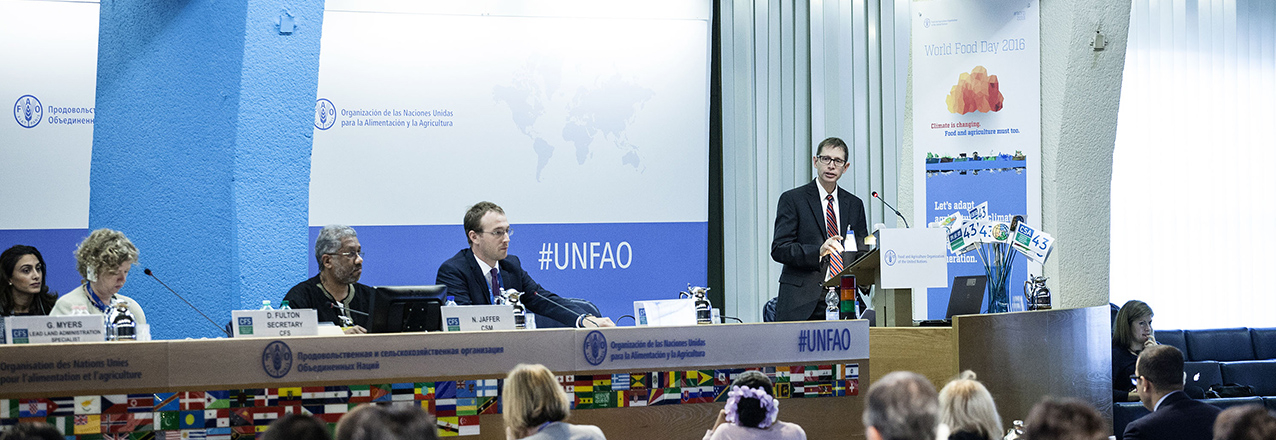Improving tenure featured prominently at the 43rd session of the Committee on World Food Security (CFS), held during October 17-21 in Rome. Attention focused on identifying lessons learned and good practices following CFS’s endorsement in 2012 of the Voluntary Guidelines on the Responsible Governance of Tenure of Land, Fisheries and Forests in the Context of National Food Security.
A call from CFS to document successful experiences in using the Voluntary Guidelines resulted in a compilation of many examples provided by governments, civil society and private sector, and including the Food and Agriculture Organization of the United Nations (FAO), USAID and the Global Donor Working Group on Land. Themes common to many of these examples are:
- ensuring political will and sustained commitment;
- establishing inclusive multi-stakeholder platforms and linking them to processes to reform policies, laws and systems; and
- empowering stakeholders and enabling them to develop the capacity to actively engage in tenure-related issues and defend their rights.
In addition, the compilation recognizes the need to monitor the Voluntary Guidelines to inform stakeholders of progress in improving tenure governance, in particular for vulnerable and marginalized people.
A plenary session on monitoring the Voluntary Guidelines on October 19 was opened by the Chair of CFS, H.E. Amira Gornass, and led with panelists from governments (represented by Juan Pablo Diaz Granados Pinedo, Colombia; Ali Mohamed Camara, Senegal; and Ir Wiratno, Indonesia), civil society (Naseegh Jaffer) and the private sector (John Young Simpson). The session, moderated by Gregory Myers, also provided an opportunity for a large number of speakers from the floor to describe additional experiences of using the Voluntary Guidelines to improve governance of tenure.
A number of side events at CFS expanded on various aspects of improving the governance of tenure and the Voluntary Guidelines. Topics included monitoring, gender, law, transparency, and the implementation of the AU Declaration on Land in Africa.
A common message throughout CFS 43 was linking improvements to tenure with the Sustainable Development Goals, with the Voluntary Guidelines being viewed as the key reference for doing so. The report of the plenary session highlighted that “the VGGT have been used and applied in many countries since they were endorsed by CFS in 2012” and that “legal and policy frameworks, which have been reformed in line with the VGGT, will have a large impact on a high proportion of the population once implemented.”
The plenary session called for the use and application of the Voluntary Guidelines to be “monitored on a regular basis” and for “standardization of the quantitative indicators used across countries to measure the results [that] would improve the quantitative analysis in the future.”
CFS 43 has provided an opportunity to look forward to 11 May 2017, the fifth anniversary of the endorsement of the Voluntary Guidelines and plans are being developed for a significant event to recognise this important anniversary.
In the meantime, FAO is further developing its VGGT implementation support programme. The first phase (2012-16) addressed raising awareness of the Voluntary Guidelines and how they can be used at the global, regional and national levels; the development of capacity of different stakeholders to improve tenure governance using the Voluntary Guidelines; the development of partnerships; targeted support to a number of countries that reported on their progress at CFS 43; and the monitoring of the use of the Voluntary Guidelines to improve tenure governance. The second phase, already under way, emphasizes even more strongly support at the country level with continuing positive cooperation and support of donors.


